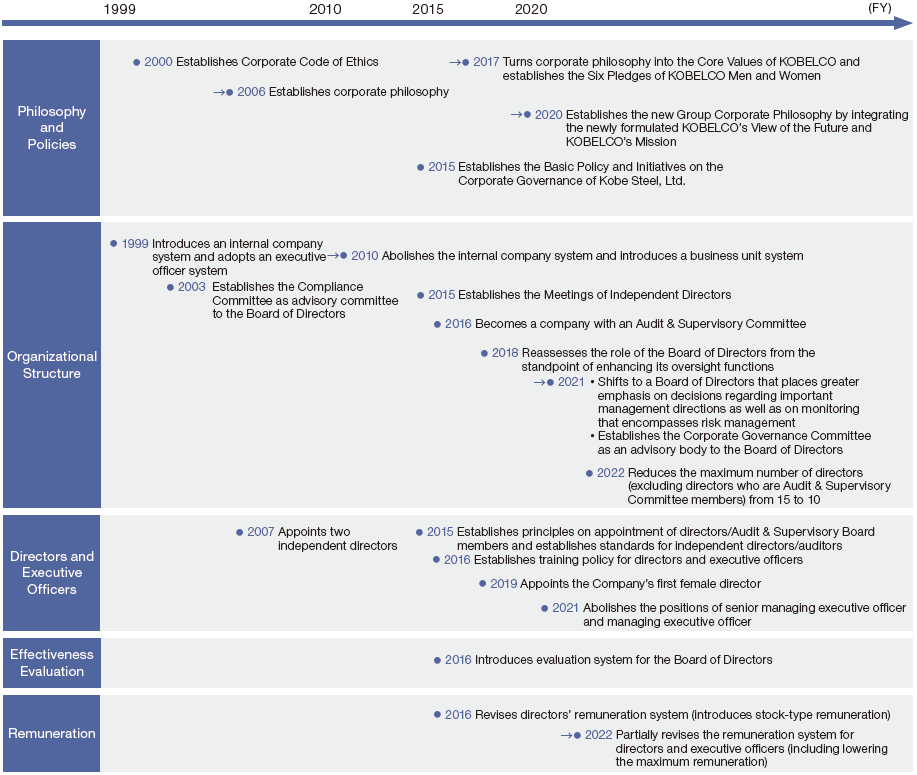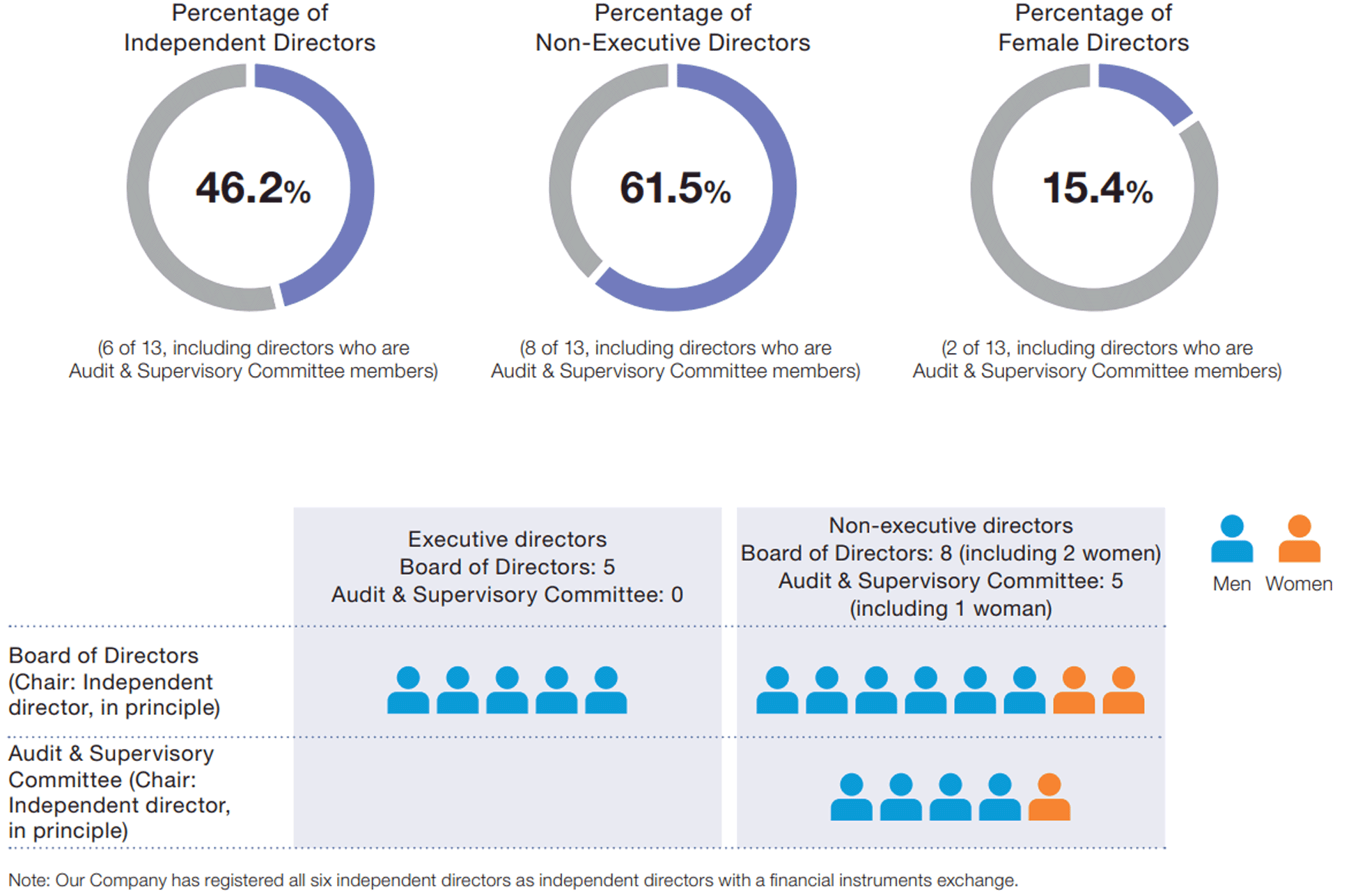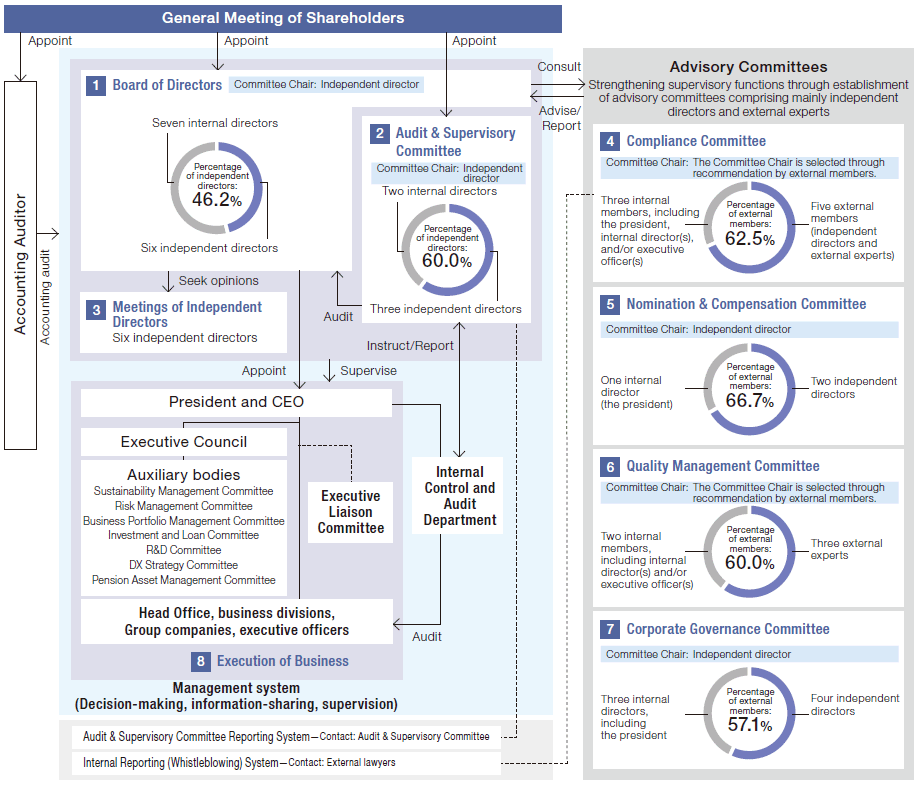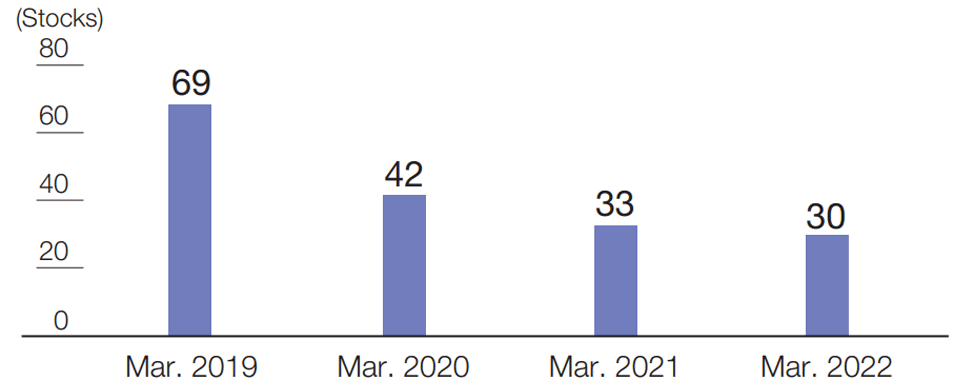The KOBELCO Group recognizes that corporate value includes not only business results and technological capabilities but also the stance on social responsibility to all stakeholders, such as shareholders and investors, customers, business partners, employees and community members. We believe that working earnestly to improve all of these factors leads to the enhancement of corporate value.
Therefore, corporate governance is not merely a form of the organization, but it is a framework for realizing all the efforts the Group is undertaking. In the development of the framework, the Group places importance on the following: establishing a system that contributes to improving corporate value through appropriate risk-taking, collaborating with stakeholders, promoting appropriate dialogue with investors in the capital market, ensuring the rights of and fairness for shareholders, and ensuring transparency.
Based on this belief, the Group aims to enhance corporate value over the medium to long term by promoting sustainability management with the Group Corporate Philosophy positioned as the foundation of all business activities


The Company believes the source of its corporate value lies in synergies generated by a wide range of segments in different demand fields, business environments, sales channels, and business scales, while recognizing that the pursuit of technological development and innovation, which is the cornerstone of the Company’s sustainable growth, cannot be achieved without discussions with manufacturing sections.
Furthermore, the Company believes it is necessary for the Board of Directors to hold active discussions and make appropriate decisions regarding the risk management and the distribution of management resources for a wide range of businesses, and at the same time, to flexibly supervise business execution. In order to achieve this, it is desirable that the Board of Directors have members with a correct understanding of the Company’s business execution without completely separating the supervisory and execution functions.
In line with this approach, the Company has adopted an Audit & Supervisory Committee whose members have voting rights on the Board of Directors. Under this governance structure, the Company aims to enable comprehensive audits of its extensive businesses, maintain and strengthen the supervisory function of the Board of Directors, and accelerate decisionmaking on management, with no clear boundaries that separate the supervisory and execution functions.
In order to improve the effectiveness of monitoring, the Company has established advisory committees, which are responsible for providing appropriate recommendations to the Board of Directors regarding compliance, nomination and compensation, quality management, and corporate governance. In order to improve the effectiveness of business execution, the Company established the Executive Council as a forum where executives, including the president, discuss important matters. In addition, the Company has set up various committees as auxiliary bodies to the Executive Council in order to oversee and promote important matters related to the entire Company, such as sustainability and business portfolio management. The activities of these committees are monitored by the Board of Directors.

The number of directors (excluding directors who are Audit & Supervisory Committee members) shall be not more than 10 as stipulated under the Articles of Incorporation of the Company. The Company takes the following measures to ensure that an appropriate number of directors constitutes the Board of Directors to facilitate substantial discussion at meetings of the Board of Directors as well as enhance the auditing function, while considering its diversity.
The Company’s Board of Directors places emphasis on determining important management directions and monitoring, including risk management. In addition to the president, directors who oversee the specific functions of Companywide importance shall be appointed as executive directors. In order to further enhance active discussions, appropriate decisionmaking, and supervision, it is essential to reflect external fair and neutral viewpoints and the viewpoints of stakeholders including minority shareholders. Therefore, in addition to the independent directors who are Audit & Supervisory Committee members, the Company invites several independent directors who are not Audit & Supervisory Committee members to the Board of Directors. The Chairman of the Board of Directors is elected from among the independent directors.
In principle, the Audit & Supervisory Committee of Kobe Steel consists of five directors, including two internal directors and three independent directors. This membership is not only in accordance with the rules of Japan’s Companies Act on a company with an Audit & Supervisory Committee, which require at least three non-executive directors (the majority of whom shall be independent directors), but also ensures transparency and fairness and encourages satisfactory auditing for the execution of duties by directors responsible for a wide range of business segments. The Chair of the Audit & Supervisory Committee is selected from among independent directors.
Internal directors who are full-time Audit & Supervisory Committee members are mainly responsible for acting as liaisons between the management team and the Audit & Supervisory Committee and for coordinating with the internal audit departments. Independent directors who are Audit & Supervisory Committee members are responsible for providing expert knowledge with respect to auditing and for maintaining fairness. To ensure these roles are fulfilled, the Company appoints independent Audit & Supervisory Committee members from diverse fields, including legal, financial, and industrial circles. In addition, at least one of the Audit & Supervisory Committee members shall have a considerable degree of knowledge on finance and accounting in order to improve the effectiveness of audits.
The Company has established the Meetings of Independent Directors to take full advantage of the independent directors’ capabilities. The meetings are a platform where the Company shares with independent directors information regarding the Company’s businesses excluding the nomination and compensation of executives.
The Meetings of Independent Directors consist solely of independent directors. Regular meetings are held every quarter and ad-hoc meetings are held when necessary.
The executive directors of the Company attend the Meetings of Independent Directors as appropriate to share information and exchange opinions with the independent directors.
The Company has established the Compliance Committee as an independent advisory body to the Board of Directors. The committee deliberates matters regarding compliance with laws, regulations, and ethics in the Company’s business activities.
The Compliance Committee consists of the president, the director/executive officer overseeing Companywide compliance, the executive officer responsible for Companywide compliance, lawyers (without a retainer agreement executed by the Company) in charge of receiving reports via the Internal Reporting (Whistleblowing) System, independent directors, and external experts. The majority of the committee consists of members from outside the Company. The committee chair is selected through mutual recommendation among the external members.
The Compliance Committee formulates fundamental policies regarding compliance activities, monitors the progress of compliance activities, and submits reports and recommendations on necessary actions to the Board of Directors. The committee holds regular meetings semiannually and ad-hoc meetings when necessary.
The Company has established the Nomination & Compensation Committee as a body to report on matters such as the nomination, appointment, and dismissal of candidates for directors and executive officers, including the appointment of the CEO, as well as the remuneration system for directors and executive officers and other matters, with the aim of further increasing the fairness and transparency of the operation of the Board of Directors. The committee consists of three to five members appointed by the Board of Directors, including the president, with the majority of members comprising independent directors. Meetings are held at least once every fiscal year and as needed. The Board of Directors fully respects the opinions reported by the Nomination & Compensation Committee and decides on the matters reported. The committee chair is selected from among the independent directors.
The Company has established the Quality Management Committee as an advisory body to the Board of Directors. The committee undertakes the continuous monitoring and makes recommendations regarding quality management enhancement activities within the Group, as well as the monitoring of the effectiveness of measures to prevent recurrence of the quality misconduct. Members of the committee include two internal executives of the Company and three external experts selected by the Board of Directors who have technical or legal knowledge on quality control. The committee chair is selected through mutual recommendation among the external members.
The Company has established the Corporate Governance Committee as an advisory body to the Board of Directors. The committee deliberates matters regarding corporate governance, including the formulation of basic policies, in order to realize corporate governance that helps to achieve the sustainable growth of the Group and enhance corporate value.
The Corporate Governance Committee consists of the president, the director or executive officer overseeing the Corporate Planning Department, the director or executive officer overseeing the General Administration and CSR Department, and independent directors appointed by the Board of Directors. Independent directors form a majority of the committee. The committee chair is selected through mutual recommendation among the independent directors. The Corporate Governance Committee meets at least once every fiscal year and calls a meeting as needed.
The Board of Directors places emphasis on determining important management directions and monitoring that encompasses risk management. The executive officers shall be responsible for the execution of business. The Company’s executive officers are appointed by the Board of Directors. They do not constitute a statutory body, but they are deemed as an important position for executing business entrusted by the Board of Directors. Under this structure, the Executive Council (which meets twice a month) is convened as a forum for deliberating important matters related to management and matters to be discussed by the Board of Directors. The members of the Executive Council include the president, executive directors, the executive officer responsible for the Corporate Planning Department, executive officers nominated by the president (heads of business divisions), presidents of affiliated companies, standing directors who are full-time Audit & Supervisory Committee members, and members appointed for each project.
The Executive Council is not a decision-making body, but a forum for frank discussion aimed at giving additional consideration to the execution of business by each business division and the Group from various aspects. Matters deliberated by the Executive Council are submitted to the Board of Directors as matters to be resolved or reported.
In order to enhance the effectiveness of deliberations by the Executive Council, various committees will be established as auxiliary bodies for important matters related to business strategy, such as sustainability management, risk management, business portfolio management, and investment and loans.
In addition, the Company will establish the Executive Liaison Committee (which meets quarterly) consisting of directors, executive officers and fellows who execute business, and the presidents and officers of affiliated companies nominated by the president.
The Executive Liaison Committee is a forum to share information on important matters related to management, and it is also considered a venue to conduct training by inviting instructors from inside and outside the Company in order to acquire and update as appropriate various knowledge necessary for the integrated management and business execution of the Group.
Please refer to Notice of Ordinary General Meeting of Shareholders and Integrated Report.
The Company carries out the following initiatives in order to ensure that the Board of Directors fulfills its decision-making and supervisory functions appropriately.
In order for directors and executive officers to fulfill their roles and responsibilities, the Company offers the following training programs as opportunities to acquire and appropriately update the necessary knowledge. The Company will support the expenses for training.
The Company recognizes that the development of successors to the CEO is one of the most important issues for its management. The qualities and human resources required to solve the Company’s management issues and enhance corporate value are discussed on a continued basis at the Nomination & Compensation Committee, chaired by an independent director and composed of a majority of independent directors.
Our policy on strategic holdings of shares is as follows.
The Company’s criteria for exercising voting rights are as follows.

The Company has established an executive remuneration system in order to improve corporate value over the medium to long term, as well as to effectively offer incentives for executives to carry out their expected roles to their fullest capacities.
Remuneration for the Company’s executives (excluding remuneration for Directors who are Audit & Supervisory Committee members) consists of basic remuneration paid as fixed compensation, performance-based compensation linked to the achievement of business result targets for each fiscal year, and stock compensation with the goal of sharing values with shareholders. Taking into consideration their duties, part-time Inside Directors and Independent Outside Directors are not eligible for performance-based compensation, and Independent Outside Directors are not eligible for stock compensation.
The Company’s Directors who are Audit & Supervisory Committee members are only paid basic remuneration as fixed compensation, taking into consideration their duties.
The remuneration framework for Executive Officers (excluding Directors) is the same as the framework for Directors.
In fiscal 2021, remuneration and other amounts payable to the Accounting Auditor by the Company totaled 159 million yen, and the total amount of money and other financial interests payable by the Company and its subsidiaries was 477 million yen.
In accordance with the Group Company Management Regulations, the Company obliges its Group companies to consult with the supervisory divisions and the Head Office divisions of Kobe Steel and report on important matters, when they make important decisions. The Company also requires Group companies to obtain prior approval of its Board of Directors and the president for the disposal of assets exceeding a certain amount in value in order to ensure the integrated business operation of the Group. However, since listed companies need to maintain a certain level of managerial independence from the Company, the Company takes care not to bind the independent judgment of the management of Group companies.
The Company pursues the ideal form of capital relations by comprehensively taking into account the various situations of Group companies in terms of the business contents, scale, financial strategies for business development, financing, etc., for the overall enhancement of corporate value as a corporate group. Under this approach, two of the Company’s subsidiaries are currently listed. Going forward, the Company will continue to examine how the ideal corporate group should be from the perspective of enhancing corporate value including the corporate governance of the Group.
| Listed Subsidiaries | Benefits of Listing | Uniqueness of Business | Independent Directors |
|---|---|---|---|
| Nippon Koshuha Steel Co., Ltd. |
|
|
The Company has appointed two independent directors from the perspectives of protecting minority shareholders, improving management fairness, andincreasing transparency. These two directors have never belonged to the Company or any Group company that has a capital relationship with the Company |
| Kobelco Wire Company, Ltd. |
|
|
The Company has appointed two independent directors from the perspectives of protecting minority shareholders, improving management fairness, and increasing transparency. These two directors have never belonged to the Company or any Group company that has a capital relationship with the Company. |